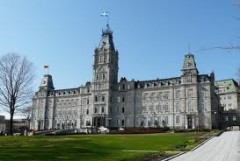On Nov. 7, the Quebec government tabled Bill 60, the so-called Charter of Quebec Values, in the province’s National Assembly.

The law would forbid all public employees from wearing “overt and conspicuous” religious symbols and headgear, including Muslim face veils, Jewish yarmulkes, Sikh turbans, or large crucifixes.
The regulations would apply only to publicly-paid employees, including police officers, prosecutors, doctors, teachers, daycare workers and other government workers.
The rules would come into force one year after the bill becomes law, though with a five-year transition period in some cases.
The sovereigntist Parti Québécois government, which holds 54 of the 125 seats in the assembly, believes that the best way to ensure the liberty of religion is by having the state be religiously neutral. These restrictions would reflect the state’s neutrality, according to its advocates.
“If the state is neutral, those working for the state should be equally neutral in their image,” Bernard Drainville, the minister responsible for the charter, remarked.
The opposition Quebec Liberal Party has historically always defended civil rights and freedoms, including freedom of religion. But leader Philippe Couillard is hedging, and has asked that a party committee study the issue. Apparently a few of his 48 MNAs are in favour of some aspects of the bill.
Couillard, who at the moment does not have a seat, declared that he is ready to take a serious look at a proposal to ban religious insignia and clothing for some civil servants, on one condition: “It has to be done in total accordance with the charters of rights, both the Canadian and the Quebec Charter,” he said.

The Coalition Avenir Québec, with 18 seats, has so far taken no official stand on the issue.
The proposed legislation has, predictably, been met with almost universal condemnation in the rest of Canada. The PQ considers itself a left-of-centre party, yet to many advocates of multiculturalism in the country, this seems to place them in the same category as those xenophobes, and even racists, who oppose diversity.
Premier Pauline Marois was particularly incensed after a Quebecois journalist, Martin Patriquin, published an opinion piece, “Quebec’s Tea Party Moment,” in the Nov. 13 edition of the New York Times, asserting that the PQ has now “ventured into Tea Party territory.”
Non-francophone groups and religious minorities in the province have also, understandably, been less than enthusiastic.

On Nov. 13, Dr. Lawrence Rosenberg, executive director of Montreal’s Jewish General Hospital, called the proposed charter “flawed and contrary to Quebec’s spirit of inclusiveness and tolerance,” and added that the hospital would ignore it if passed, in a written statement endorsed by the hospital’s board of directors. The Jewish General would not even ask for an exemption to the law.
But the legislation may be popular among the PQ’s own base. A Leger poll taken in late September showed that 46 percent of all Quebec voters consider immigration to be a threat to “the heritage of Quebec society,” a figure that rises to 57 percent in rural areas where the PQ is strong.
To understand where this charter is, so to speak, coming from, it’s necessary to view the context in which it is being proposed. We have to examine the different historical circumstances that are behind it. This is not to condone it, but to understand its ideological roots.
I have identified four important issues:
First, Quebec is a French Canadian “homeland” nation, like Serbia or Sweden. It’s not just a “Nebraska” or “Saskatchewan,” places that don’t “belong” to a specific ethnic group. In those places, no other community can be seen as a “threat” to the “nation.” The rest of Canada actually accepts this definition of Quebec — the province is considered a “distinct society,” after all.
Secondly comes the fact that the French Canadians were conquered, in the 18th century, by others who didn’t accommodate themselves to the majority culture. The British Protestants who took over after 1759 didn’t become French-speaking Catholics. And the immigrants that followed, especially non-Catholics, moved into the anglophone sphere, humiliating the majority population as a conquered people without control over their own “homeland.”

So for decades, the accommodation ran the other way — only with the Quiet Revolution of the 1960s did French Quebeckers become “maîtres chez nous” (“masters in our own house”). And so there is a fear, however unfounded, that a new wave of immigrants, even if speaking French, will also not become part of “la patrie.”
Third, in Quebec there is a strong strain of anti-clericalism, one that has followed centuries of what many consider cultural and religious oppression by a hegemonic Roman Catholic church. The secularization of French Canadian society only began in the 1960s, and so many see all religion as repressive.
Pre-1960s Quebec is now viewed by those on the left as “la grande noirceur” (“the great darkness”), an era when so many Québécois were uneducated and under the supposed thumb of priests and nuns, and it makes many in the province wary of any religious presence. There was no equivalent to this in the pluralistic, largely Protestant, English Canada, where separation of church and state does not involve removing religion from the public square.
Finally, many strands of Quebec feminism, unlike the multicultural version prevalent elsewhere, consider all religious garb as inherently oppressive to women and forced on them by males.
The PQ will have to win support from other parties in order to pass the legislation, as it is a minority government. But even if the charter manages to be passed into law, most of it will probably be struck down by the Supreme Court of Canada. The separatists will then claim that this demonstrates the need for Quebec to become a sovereign nation.
Henry Srebrnik is a professor of political science at the University of Prince Edward Island.